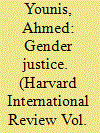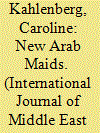| Srl | Item |
| 1 |
ID:
174574


|
|
|
|
|
| Summary/Abstract |
This article reviews the female labour force participation rates (LFPR) of Jewish and Arab women in Israel from 1955 to 2017. One finding of the review is that the female Jewish LFPR are very high, while the female Arab LFPR are very low. We argue that the most likely explanation for this difference is cultural forces in the respective communities which either encourage or discourage women from working. We find support for this idea from LFPR data within subsectors of the two groups, Bedouin women living in the south of Israel, and Jewish women born in the land of Israel.
|
|
|
|
|
|
|
|
|
|
|
|
|
|
|
|
| 2 |
ID:
119944


|
|
|
| 3 |
ID:
174494


|
|
|
|
|
| Summary/Abstract |
The “new Arab woman” of the early 20th century has received much recent scholarly attention. According to the middle- and upper-class ideal, this woman was expected to strengthen the nation by efficiently managing her household, educating her children, and contributing to social causes. Yet, we cannot fully understand the “new Arab woman” without studying the domestic workers who allowed this class to exist. Domestic workers carried out much of the physical labor that let their mistresses pursue new standards of domesticity, social engagement, and participation in nationalist organizations. This article examines relationships between Arab housewives and female domestic workers in British Mandate Palestine (1920–1948) through an analysis of domestic reform articles and memoirs. Arab domestic reformers argued that elite housewives, in order to become truly modern women, had to treat maids with greater respect and adjust to the major socioeconomic changes that peasants were experiencing, yet still maintain a clear hierarchy in the home. Palestinian memoirists, meanwhile, often imagine their pre-1948 homes as a site of Palestinian national solidarity. Their memories of intimate relationships that developed between elite families and peasant maids have crucially shaped nationalist narratives that celebrate the Palestinian peasantry.
|
|
|
|
|
|
|
|
|
|
|
|
|
|
|
|
| 4 |
ID:
151864


|
|
|
|
|
| Summary/Abstract |
In That Smell and Notes from Prison, Sonallah Ibrahim engages literary and feminist discourses in his political narrative against the Nasserist regime and the culture of commitment (iltizam) of the 1960s. Ibrahim's antihero is a newly released writer who is faced with the challenges of overcoming his failure to connect with women and society, and find a motivation to write. He realizes that most readers, writers and critics are not in favour of his literature of exposé, which refuses to depict or treat the ugly reality as a beautiful one. In foreshadowing the 1967 defeat and the impotence of Arabs, That Smell and Notes from Prison warns of a prolonged cultural and literary decay should political corruption override basic human and women's rights in the Arab world.
|
|
|
|
|
|
|
|
|
|
|
|
|
|
|
|